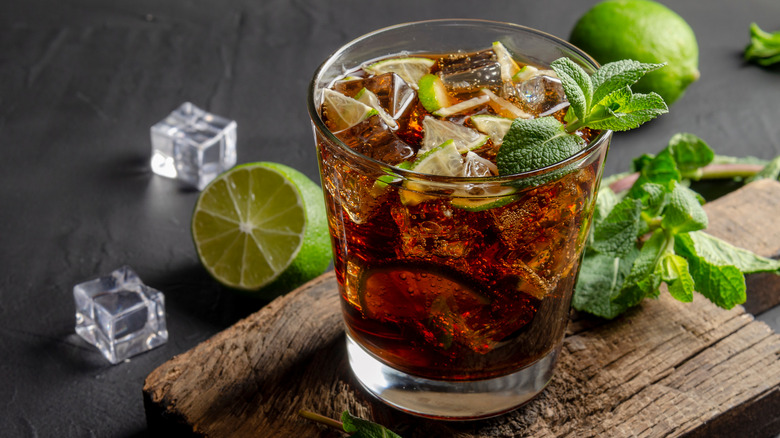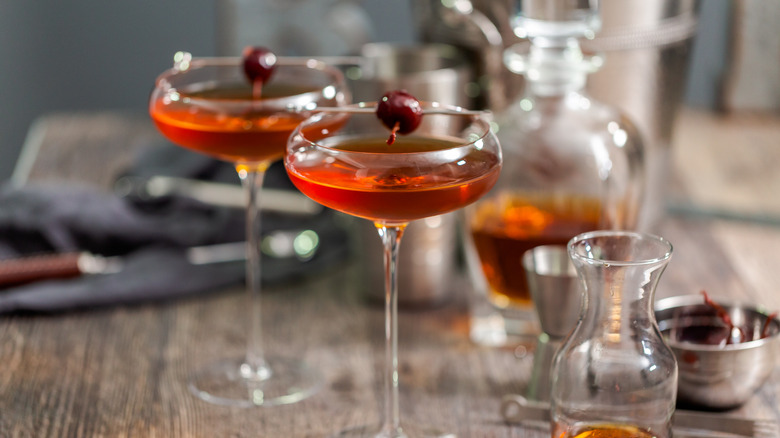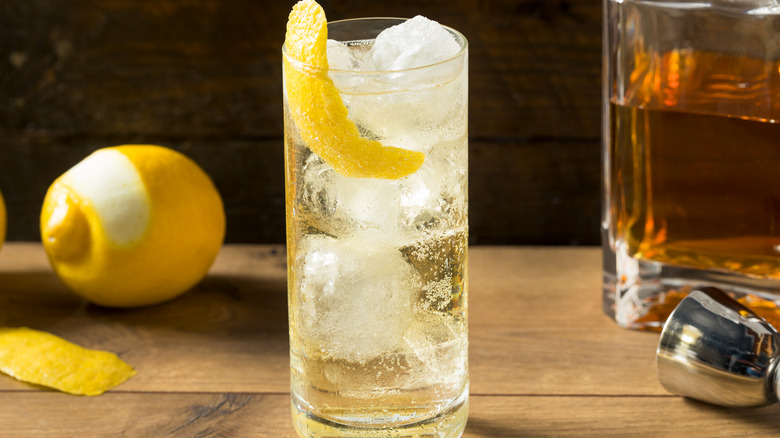There's A World Of Difference Between Cocktails And Mixed Drinks
You don't have to be a master mixologist to make rum and Coke. The drink's simplicity, both in terms of the number of ingredients, and the amount of preparation required, means it can be whipped up in a jiffy by just about anyone.
This example highlights the differences between cocktails and mixed drinks. These drink categories are sometimes assumed to be synonymous, and by strict dictionary definitions, there's a case to be made for this assertion. Both cocktails and mixed drinks, for example, are defined as being made with alcohol, and having at least one additional ingredient. But in the restaurant and bar industries at least, the two are recognized as distinct categories. In fact, there's a world of difference between cocktails and mixed drinks — not only in terms of the number of ingredients, but in preparation, intention, and even in philosophy.
Let's start with the most basic difference. In the bar world, mixed drinks are those with two ingredients, one of which is alcohol. Gin and tonic, rum and Coke, and vodka and orange juice are all examples of mixed drinks — although the latter two have cocktail names (Cuba libre and screwdriver, respectively). Cocktails, by contrast, are more complicated. Typically, there are at least three ingredients. The so-called golden ratio in cocktails, for instance, mandates a base liquor combined with both sweet and sour flavors. This added degree of complexity for cocktails is reflected in more sophisticated preparations, like shaking, stirring, and muddling.
Differences in complexity, effort, and intention
Ask a dozen bartenders to define the difference between cocktails and mixed drinks, and you're likely to get a dozen different answers. There are no hard and fast rules. But most in the bar world agree that there's a vast difference between the two in terms of complexity, and in terms of thought and effort. A cocktail is a drink that not only includes more (and typically fresher) ingredients but also is more time-consuming and difficult to prepare. It requires more time and effort, in other words. It's a balancing act of complexity.
A cocktail can include a variety of diverse ingredients, from fruits and fruit juices to sodas, syrups, and bitters. In fact, cocktails can also be made without liquor. Typically, this requires a kind of disclaimer — calling it a virgin, mock, or non-alcoholic cocktail, for instance — but given the right number of ingredients and degree of preparation, these drinks certainly meet most bartenders' definition of a cocktail. A mixed drink, by contrast, simply has liquor and something else: generally, soda, or juice. It's uncomplicated and has no specific recipe.
This is an important distinction, actually, as cocktails are made from formulaic recipes with the goal of achieving balanced, harmonious flavors. The mixer in mixed drinks, on the other hand, may actually be used to mask or conceal the strong flavor of the base liquor.
How Prohibition contributed to the rise in mixed drinks
Prohibition, as it turns out, may have played a part in the differentiation between the two categories. Cocktails, because of the increased complexity of ingredients and more sophisticated preparations, were traditionally the domain of very skilled bartenders. But when many of these professionals were forced out of their jobs by Prohibition, it opened a path for a more basic form of bartending — meaning mixed drinks.
Of course, simpler cocktail forms, like the highball, already existed. The first highball dated to the late 19th century, and consisted solely of scotch and soda. Today, this and other highballs are considered by most bartenders to be mixed drinks, not cocktails. Not surprisingly, then, the popularity of highballs increased dramatically during Prohibition when skilled bartenders were in short supply. The underground speakeasies of the era also tended to be stocked with cheap alcohol, leading to a greater emphasis on masking liquor, something far more associated with mixed drinks than cocktails.
Today, the debate over the two categories continues, but it seems mainly to be contended by bartenders and bar owners, who want to differentiate drinks that require real effort and skill from those that don't. In a way, it's a matter of respect. Anyone, after all, can make a rum and Coke.



